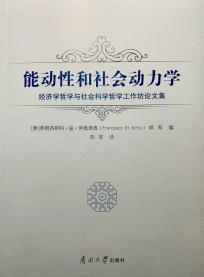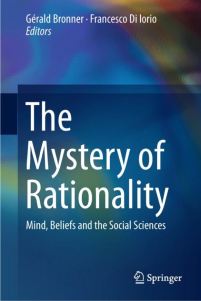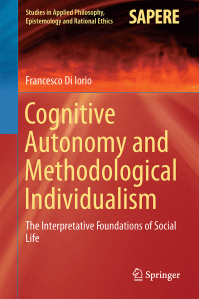In English
THE PALGRAVE HANDBOOK OF METHODOLOGICAL INDIVIDUALISM, VOLUME I
(co-edited with Nathalie Bulle, CNRS/Sorbonne University)

Palgrave Macmillan
2023
CONTRIBUTORS
Jon Elster (Columbia University/College de France), Dario Antiseri (Luiss University), Peter Boettke (George Mason University), Maria-Pia Paganelli (Trinity University Texas), Thomas Schwinn (Max-Weber-Institute of Sociology/Heidelberg University), Gérald Bronner (Sorbonne University/ French Academy of Technologies), Charles Crothers (Auckland University of Technology), Erhard Friedberg (CNRS/Sciences Po), Malte Dold (Pomona College), Nathalie Bulle (CNRS/Sorbonne University), Paul Dumouchel (University of Quebec in Montreal), Hartmut Esser (Mannheim University), Gianluca Manzo (Sorbonne University), Ian Jarvie (York University), Makoto Kogawara (Kagoshima University), Robert Leroux (University of Ottawa), Thomas S. Eberle (University of St. Gallen), Sylvie Mesure (CNRS/Sorbonne University), Anthony Giddens (Cambridge University and London School of Economics),Emmanuel Picavet (Paris 1 Panthéon-Sorbonne University), Riccardo Viale (University of Milano-Bicocca), Jean-Michel Morin (Université de Paris Cité), Rosolino Candela (George Mason University), Mohamed Cherkaoui (Sorbonne University), Karl-Dieter Opp (Leipzig University/University of Washington), Jean Petitot (EHESS Paris), Gustav Ramström (Stockholm University), Enzo Di Nuoscio (University of Molise and Luiss University), Kei Yoshida (Waseda University Tokyo), Wolf Feuerhahn (CNRS/EHESS), Antonio Rainone (University of Naples “L’Orientale”), Raymond Boudon (Sorbonne University and French Academy of Moral and Political Sciences), Francesco Di Iorio (Nankai University), Renaud Fillieule (CNRS/University of Lille), Yoji Matsuo (Hiroshima Shudo University), Han-Seob Yeo (Meiji University), Christian Robitaille (Liverpool Hope University).
THE PALGRAVE HANDBOOK OF METHODOLOGICAL INDIVIDUALISM, VOLUME II
(co-edited with Nathalie Bulle, CNRS/Sorbonne University)

Palgrave Macmillan
2023
CONTRIBUTORS
Steven Lukes (New York University), Ye Liu (King’s College London), Joseph Agassi (York University and Tel Aviv University), Daniel Little (University of Michigan-Dearborn/University of Michigan), Alain Marciano (Université de Montpellier), David D’Avray (University College London), Erhard Friedberg (Sciences Po Paris), Jens Greve (University of Heidelberg and University of Bielefeld), Simon Langlois (Laval University), Ye Liu (King’s College), Anthony Oberschall (University of North Carolina), Richard Münch (Zeppelin University/Otto Friedrich University), Michael Rosenberg (Concordia University), Michael Schmid (Neubiberg University), Stephen P. Turner (University of South Florida), Alban Bouvier (Institut Jean Nicod, ENS), Olivier Favereau (University of Paris-Nanterre), Francesco Di Iorio (Nankai University), Gianluca Manzo (Sorbonne University), Branko Mitrovic (Norvegian University of Science and Technology), Ieva Zake (Millersville University), Pierre Demeulenaere (Sorbonne University), Salvatore Abbruzzese (Trento University), Christopher J. Coyne (George Mason University), Hans Kippenberg (University Groningen/University of Bremen/Jacobs University Bremen), Jean-Baptiste Fleury (Sorbonne University), Werner Raub (Utrecht University) Arnout van de Rijt (European University Institute), Natalia Ruiz-Junco (Auburn University), Gunther Schlee (Max Planck Institute), Raymond Boudon (Sorbonne University and French Academy of Moral and Political Sciences), Daniel R. Morrison (Abilene Christian University), Karras J. Lambert (George Mason University).
OVERVIEW
While methodological individualism is a fundamental approach within the social sciences, it is often misunderstood. This highlights the need for a discursive and up-to-date reference work analyzing this approach’s classic arguments and assumptions in the light of contemporary issues in sociology, economics and philosophy. This two-volume handbook presents the first comprehensive overview of methodological individualism. Chapters discuss historical and contemporary debates surrounding this central approach within the social sciences, as well as cutting edge developments related to the individualist tradition with philosophical and scientific implications. Bringing together multiple contributions from the world’s leading experts on this important tradition of theorizing, this collective endeavor provides teachers, researchers and students in sociology, economics, and philosophy with a reliable and critical understanding of the founding principles, key thinkers and intellectual development of MI since the late 19th century.
ENDORSEMENTS
“This is a truly heroic accomplishment. The two volumes provide a unique treasure of multifarious perspectives and insights into key issues in the ontology, epistemology and methodology of social sciences. This giant collection will be immensely useful for students and researchers alike.”
Uskali Mäki (University of Helsinki, Finland)
“This collection of essays represents a major and much needed academic achievement. For it brings together a wide ranging discussion on a topic—methodological individualism—that for too long has lacked any comprehensive, in depth, and scholarly treatment of the many dimensions this position touches in philosophy of social science. By assembling such an impressive array of scholars, Bulle and Di Iorio have provided all researchers and scholars in this area now and for the foreseeable future with a much needed resource, one destined to provide an authoritative voice for all those concerned with these critical debates.”
Paul A. Roth (University of California Santa Cruz, USA)
“This is a tremendous survey, both wide-ranging and original, a veritable mother lode of useful analyses, from some of the leading figures in the field. The editors are to be congratulated”.
Barry Smith (The State University of New York at Buffalo, USA)
THE MYSTERY OF RATIONALITY
MIND, BELIEFS AND THE SOCIAL SCIENCES
(co-edited with Gérald Bronner, Sorbonne Paris-4 University and French Academy of Technologies)
Springer
2018
AMAZON
CONTRIBUTORS
Joseph Agassi (Tel Aviv University and York University), Peter Boettke (George Mason University), Alban Bouvier (Institut Jean Nicod, ENS), Enzo Di Nuoscio (UniMol), Paul Dumouchel (Ritsumeikan University), Shaun Gallagher (University of Memphis), Herbert Gintis (Santa Fe Institute), Ian Jarvie (York University), Roger Frantz (San Diego University), Daniel Little (University of Michigan-Dearborn), Pierre Livet (Aix-Marseille University), Leslie Marsh (University of British Columbia), Karl-Dieter Opp (Leipzig University and and University of Washington), Emmanuel Picavet (Sorbonne Paris 1 University)
OVERVIEW
Analysis of the concept of rationality is a leitmotiv in the history of the social sciences and has involved endless disputes. Since it is difficult to give a precise definition of this concept, and there is a lack of agreement about its meaning, it is possible to say that there is a ‘mystery of rationality’. What is it to be rational? Is rationality merely instrumental or does it also involve the endorsement of values, i.e. the choice of goals? Should we consider rationality to be a normative principle or a descriptive one? Can rationality be only Cartesian or can it also be argumentative? Is rationality a conscious skill or a partly tacit one? This book, which has been written by an outstanding collection of authors, including both philosophers and social scientists, tries to make a useful contribution to the debates on these problems and shed some light on the mystery of rationality.
BOOK REVIEWS
COGNITIVE AUTONOMY AND METHODOLOGICAL INDIVIDUALISM
THE INTERPRETATIVE FOUNDATIONS OF SOCIAL LIFE
Springer
2015
AMAZON.COM
SPRINGER.COM
My book is also available as a Springer MyCopy version, which is a service that
allows library patrons to order a personal, printed-on-demand softcover edition of an
eBook for just $/€24.99.
OVERVIEW
Unlike psychologistic paradigms, the non-atomistic variant of methodological individualism discussed in this book explains society in terms of complex emergent structures that unintentionally result from human actions, and that in turn influence those actions. Friedrich Hayek is an emblematic representative of this approach, the origins of which date back to the Scottish Enlightenment. One of Hayek’s most original – but also less well-known – contributions is his linking of this non–atomistic methodological individualism to a cognitive psychology centered on the idea that mind is both an interpretative device and a self-organizing system. This book uses Hayek’s reflections on mind as a starting point to investigate the concept of action from the standpoint of non-atomistic methodological individualism, and it explores the connections between Hayek’s cognitive psychology and approaches employed in various fields, such as phenomenology, hermeneutics, enactivism, neo-Weberian sociology and fallibilism. Focusing on the interpretative foundations of social life, the book conceives action as a product of the human mind’s cognitive autonomy, i.e. of its hermeneutic skills that are influenced by historical and socio-cultural factors.
ENDORSEMENTS
“Di Iorio offers a new approach to Hayek’s Sensory Order, linking neuroscience to the old Verstehen tradition and to contemporary theories of self-organizing systems; this should be on the reading list of everyone who is interested in Hayek’s thought.”
Barry Smith, University at Buffalo, editor of The Monist
“This impressive and well-researched book breaks new ground in our understanding of F.A. Hayek and of methodological individualism more generally. It shows that methodological individualism sanctions neither an atomistic view of society nor a mechanical determinism. The book carefully analyzes an important tradition in the social sciences, and compares it to many important philosophical, sociological and economic systems of thought. This is an enlightening book for all scholars interested in the methodological problems of the social sciences.”
Mario J. Rizzo, New York University
“One of Hayek’s most important contributions is his linking of complex methodological individualism, which deals with the emergence of spontaneous orders and unintended collective structures in complex self-organizing social systems, with a cognitive psychology. What makes Francesco Di Iorio’s book of great interest is that, by building on Hayek’s seminal book The Sensory Order, it deepens the connections between cognition and rules of just conduct, taking into account relevant theories on subjectivity and consciousness such as phenomenology, hermeneutics and enactivism.”
Jean Petitot, École des hautes études en sciences sociales – EHESS, Paris
“In this thoughtful and enlightening book Francesco Di Iorio uses Hayek’s cognitive psychology as the starting point for investigation of the relationship between the autonomy of the agent and socio-cultural influences within methodological individualism. The book provides an illuminating and innovative analysis of a central issue in the philosophy of social science by setting Hayek’s view on mind and action in fruitful relation to approaches such as Gadamer’s hermeneutics, Merleau-Ponty’s phenomenology, Varela’s and Maturana’s enaction, Boudon’s interpretative sociology, Popper’s fallibilism and Mises’ praxeology. One of the most interesting aspects of this book is its argument that hermeneutics and fallibilism refer, not to two different methods but to the same one.”
Dario Antiseri, Emeritus Professor at LUISS University, Rome
“Francesco Di Iorio’s book explores, in an original way, the connections between Hayek’s methodological individualism and his fascinating idea that human mind is both an interpretative device and a self-organizing system. It is a brilliant, clearly written work, characterized by a certain intellectual courage, which makes a remarkable contribution to the sociology of knowledge.”
Gérald Bronner, Sorbonne Paris-4 University and French Academy of Technologies
BOOK REVIEWS
Johanna Hochloff (2015). Cognitive Autonomy and Methodological Individualism. The Interpretative Foundations of Social Life. Anmerkungen zum gleichnamigen Buch von Francesco di Iorio. In ORDO – Jahrbuch für die Ordnung von Wirtschaft und Gesellschaft, Bd 66: pp. 376-8.
Gabriele Ciampini (2018) Cognitive Autonomy and Methodological Individualism: The Interpretative Foundations of Social Life by Francesco Di Iorio. In Cosmos + Taxis. Studies in Emergent Order and Organization, vol. 5, issues 3-4, pp. 104-107.
In Chinese
能动性与社会动力学——经济学哲学与社会科学哲学论文集
Agency and Social Dynamics: Essays in the Philosophy of Economics and the Social Sciences
(co-edited with Hu Jun, Nankai University)

Nankai University Press
2021
CONTRIBUTORS
Bruce Caldwell (Duke University), Chor-yung Cheung (City University of Hong Kong), Paul Dumouchel (Ritsumeikan University), Daniel Little (University of Michigan-Dearborn), Uskali Maki (University of Helsinki), Jean Petitot (Ecole des hautes études en Sciences Sociales), Barry Smith (The State University of New York at Buffalo), Stephen Turner (University of South Florida), Jia Xiantong (Nankai University)
OVERVIEW
This book includes the Chinese translation of papers presented by the contributors at two scientific meetings I organized at Nankai University’s Department of Philosophy (the 2017 Workshop on the Philosophy of Economics and the Social Sciences and the 2019 Asian Conference on the Philosophy of the Social Sciences).
In Japanese
ポパーの思想における世界3と方法論的個人主義
World 3 and Methodological Individualism in Popper’s Thought

Amazon kindle book published by the Japan Popper Society
2018
AMAZON.COM
OVERVIEW
Popper’s theory of World 3 is often regarded as incongruent with his defense of methodological individualism. This book criticizes this widespread view. Methodological individualism is said to be at odds with three crucial assumptions of the theory of World 3: (a) the impossibility of reducing World 3 to subjective mental states because it exists objectively, (b) the view that the mental functions cannot be explained by assuming that individuals are isolated atoms, and (c) the idea that World 3 has causal power and influences both individual minds and actions. This book demonstrates that the inconsistency thesis stems from a confusion between methodological individualism as understood by Popper and reductionism. The reasons for this confusion are analyzed and clarified. It is argued that two variants of methodological individualism can be distinguished, and that unlike psychologistic individualism, Popper’s nonatomistic individualism is fully consistent with his theory of World 3.

